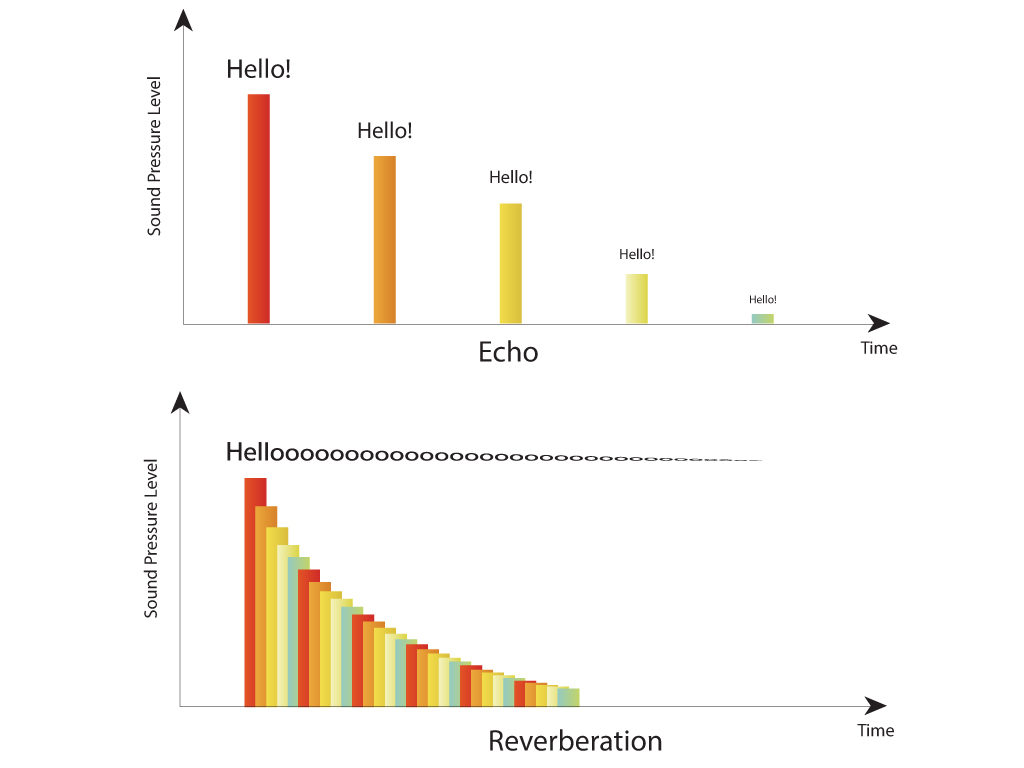What’s the difference between echo and reverberation?

This is a question that we get asked quite regularly, especially from customers who are coming across the measurement of reverberation for the first time.
I recently came across a simple, clear explanation that was written by Harout Taghilian who is an Acoustic Consultant at Ramboll.
Harout wrote:
A lot of people are confused about the difference between reverberation and an echo.
Reverberation is the persistence of sound after the sound source has been stopped. It results from a large number of reflected waves which can be perceived by the brain as a continuous sound.
On the other hand, an echo occurs when a pulse of sound can be heard twice. It is normally assumed that if there is a delay of 50ms or more between the first and the second sound reaching the ear, then they will be perceived by the brain as separate events rather than one extended event.
I hope the above explanation is a simple and a clear one.

Here’s a simple diagram that helps to explain this:
Did you know?
The Cirrus NoiseTools software has an extension module that allows for the calculation of Reverberation Time (RT60, 30 & 20) in accordance with EN ISO 3382-2 using data that has been measured using an Optimus Sound Level Meter.
The module provides:
- Calculation of reverberation time using measurements from an Optimus sound level meter
- Automatic detection of suitable data using EN ISO 3382-2:20081
- Calculation of RT20, RT30 and RT60
- Can be used with Interrupted or Impulse noise source data
- Graphical & numerical display of calculated values
- Verification of calculations in accordance with EN ISO 3382-2:20081
1 EN ISO 3382-2 Acoustics – Measurement of room acoustic parameters – Part 2: Reverberation time in ordinary rooms (ISO 3382-2:2008)
If you would like more details of this module, please get in touch and we will be pleased to help.
Need to measure noise at work?
Check out the Optimus+ Red
The Optimus+ Red is our purpose-built noise at work sound level meter, designed to IEC 61672 standards. Available as an octave band sound level meter, it’s the all-in-one solution for noise at work assessments.
Measuring personal noise exposure?
Check out the Professional doseBadge5
The Professional doseBadge5 is an advanced noise dosimeter for the measurement of personal noise exposure levels in the workplace. With Bluetooth connectivity and octave band filters as standard, it’s complete solution for noise at work and personal noise exposure assessments.
Monitoring environmental noise?
Check out the Environmental Noise Measurement Kit
Compatible with the Optimus+ Green sound level meter, the Environmental Noise Measurement Kit is the perfect solution for long-term outdoor noise monitoring. With 3G/GPRS connectivity, you can view your data in the cloud and get real-time alerts to your phone.
Download the Noise Measurement Terminology Guide to expand your noise knowledge and make measuring noise simpler.
Jaymee-lee Tolliday
Latest posts by Jaymee-lee Tolliday (see all)
- Turning Down the Volume: How the Trojan Noise Nuisance Recorder can help create a quieter world - 13th February 2024
- Festive Opening Hours 2023 - 6th December 2023
- Award of Excellence for Cloud-Based Monitoring Solutions 2023! - 20th November 2023

